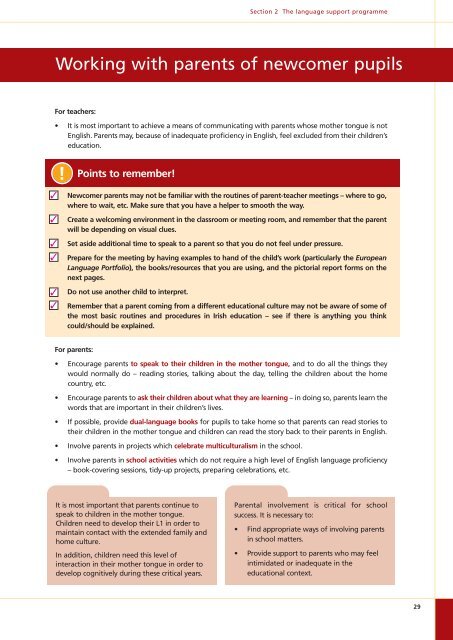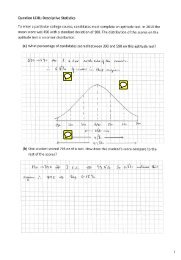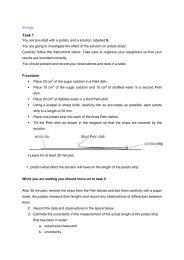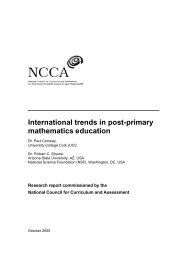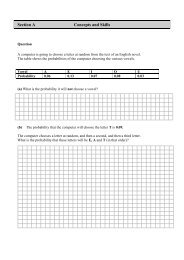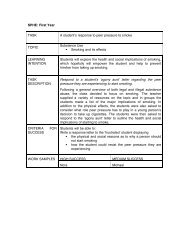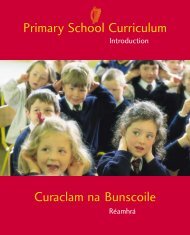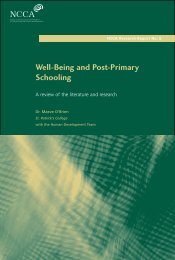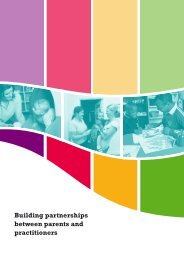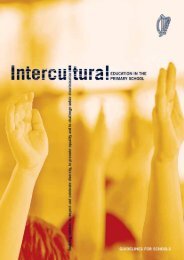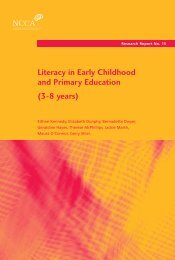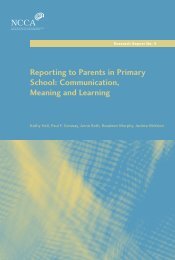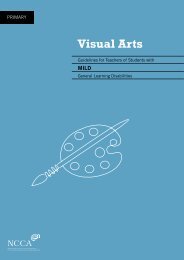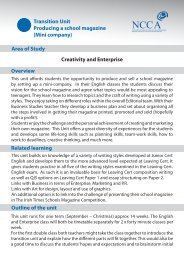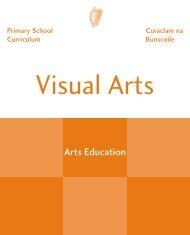Up and Away - National Council for Curriculum and Assessment
Up and Away - National Council for Curriculum and Assessment
Up and Away - National Council for Curriculum and Assessment
Create successful ePaper yourself
Turn your PDF publications into a flip-book with our unique Google optimized e-Paper software.
✓<br />
✓<br />
✓<br />
✓<br />
✓<br />
✓<br />
For teachers:<br />
It is most important to achieve a means of communicating with parents whose mother tongue is not<br />
English. Parents may, because of inadequate proficiency in English, feel excluded from their children’s<br />
education.<br />
For parents:<br />
Encourage parents to speak to their children in the mother tongue, <strong>and</strong> to do all the things they<br />
would normally do – reading stories, talking about the day, telling the children about the home<br />
country, etc.<br />
Encourage parents to ask their children about what they are learning – in doing so, parents learn the<br />
words that are important in their children’s lives.<br />
If possible, provide dual-language books <strong>for</strong> pupils to take home so that parents can read stories to<br />
their children in the mother tongue <strong>and</strong> children can read the story back to their parents in English.<br />
Involve parents in projects which celebrate multiculturalism in the school.<br />
Section 2 The language support programme<br />
Working with parents of newcomer pupils<br />
! Points to remember!<br />
Newcomer parents may not be familiar with the routines of parent-teacher meetings – where to go,<br />
where to wait, etc. Make sure that you have a helper to smooth the way.<br />
Create a welcoming environment in the classroom or meeting room, <strong>and</strong> remember that the parent<br />
will be depending on visual clues.<br />
Set aside additional time to speak to a parent so that you do not feel under pressure.<br />
Prepare <strong>for</strong> the meeting by having examples to h<strong>and</strong> of the child’s work (particularly the European<br />
Language Portfolio), the books/resources that you are using, <strong>and</strong> the pictorial report <strong>for</strong>ms on the<br />
next pages.<br />
Do not use another child to interpret.<br />
Remember that a parent coming from a different educational culture may not be aware of some of<br />
the most basic routines <strong>and</strong> procedures in Irish education – see if there is anything you think<br />
could/should be explained.<br />
Involve parents in school activities which do not require a high level of English language proficiency<br />
– book-covering sessions, tidy-up projects, preparing celebrations, etc.<br />
It is most important that parents continue to<br />
speak to children in the mother tongue.<br />
Children need to develop their L1 in order to<br />
maintain contact with the extended family <strong>and</strong><br />
home culture.<br />
In addition, children need this level of<br />
interaction in their mother tongue in order to<br />
develop cognitively during these critical years.<br />
Parental involvement is critical <strong>for</strong> school<br />
success. It is necessary to:<br />
Find appropriate ways of involving parents<br />
in school matters.<br />
Provide support to parents who may feel<br />
intimidated or inadequate in the<br />
educational context.<br />
29


